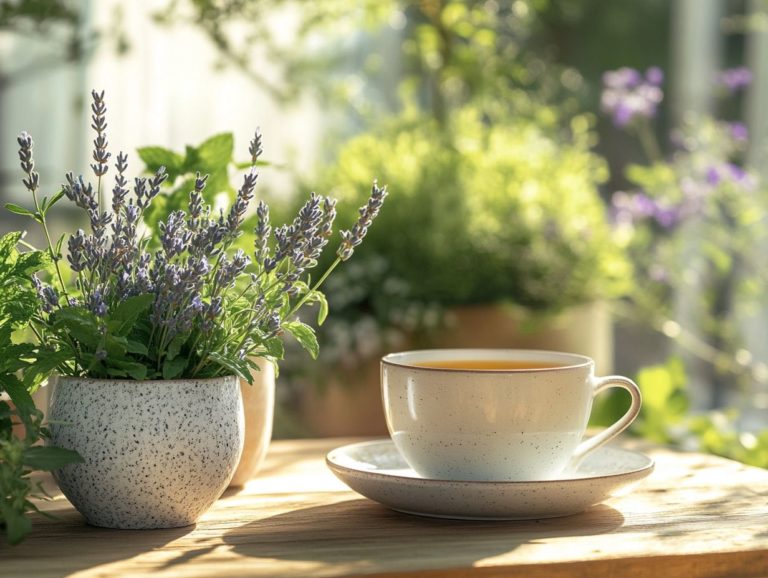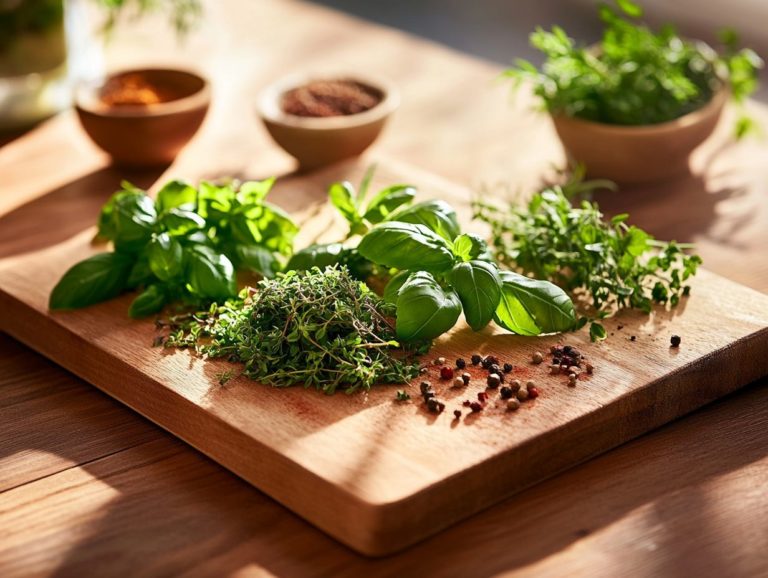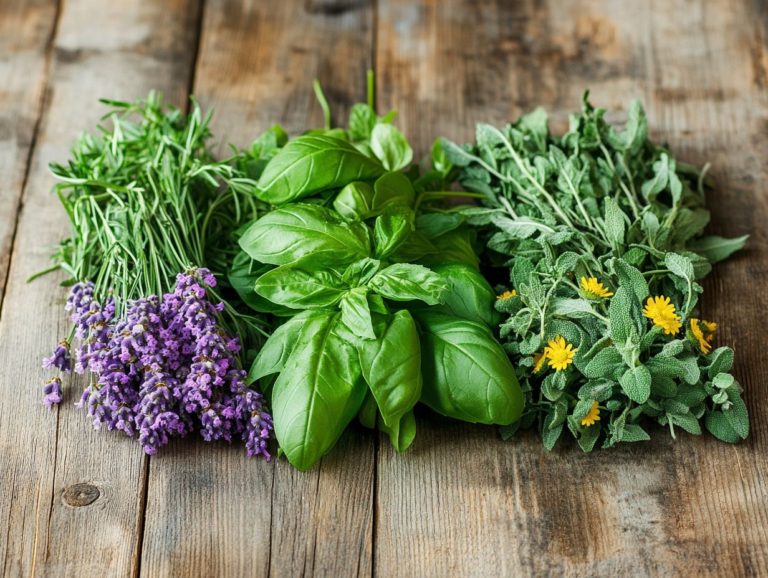The Connection Between Herbs and Gut Health
Gut health is essential to your overall well-being, impacting everything from digestion to immune function.
This discussion delves into the gut microbiome and its fascinating interaction with the herbs you consume. You ll uncover the top herbs that can elevate your gut health, learn how they work their magic, and discover practical tips for weaving them into your daily diet.
We will also address potential risks and consider alternative approaches, offering you a comprehensive guide to nurturing your gut effectively.
Contents
Key Takeaways:
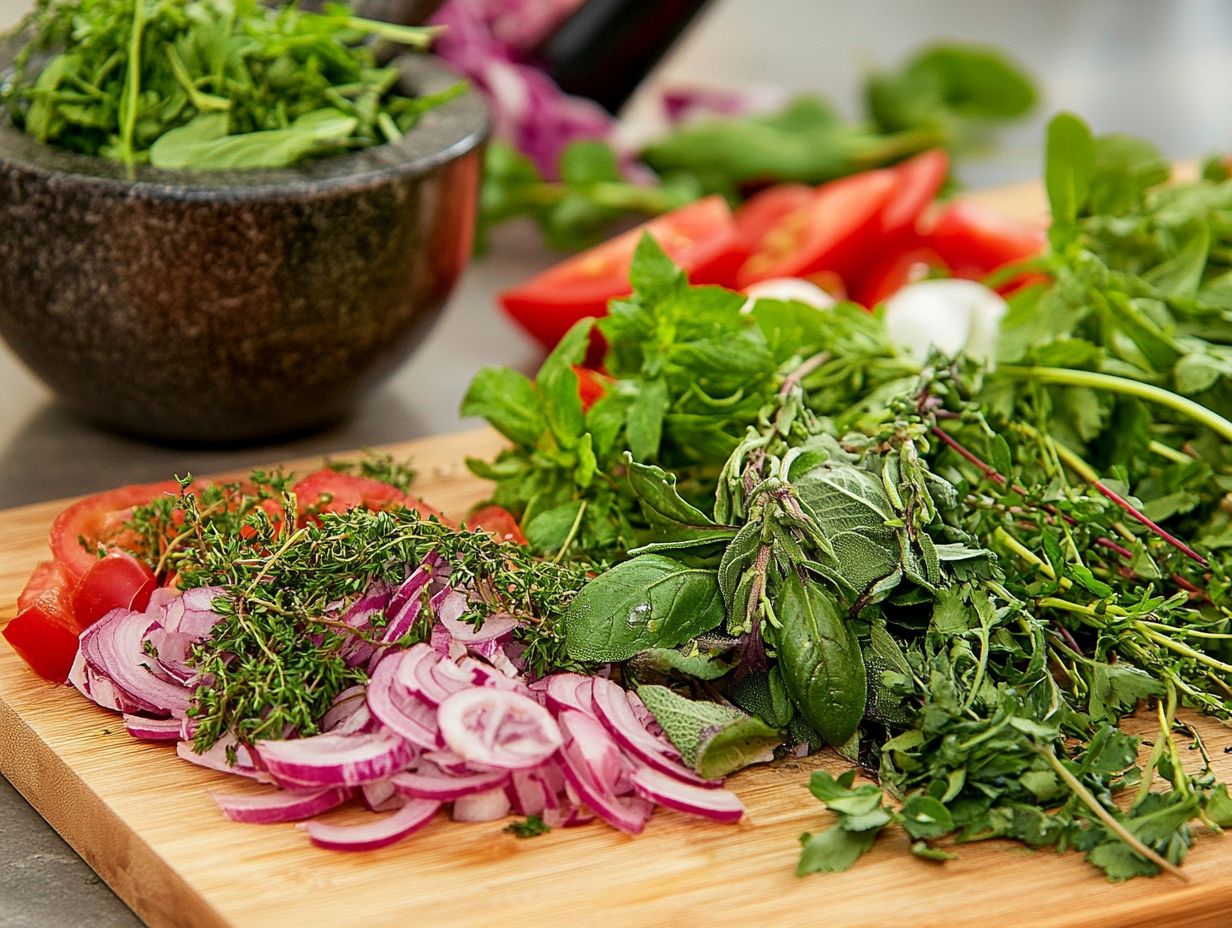
The gut microbiome plays a crucial role in overall health and well-being, and incorporating herbs into your diet can help maintain a healthy balance.
Some of the top herbs for improving gut health include ginger, peppermint, and turmeric, which have anti-inflammatory and antimicrobial properties.
Before incorporating herbs into your diet for gut health, it is important to understand their mechanisms of action and potential risks, and to consult with a healthcare professional.
Embrace herbs to enhance your gut health today!
The Importance of Gut Health
Gut health is fundamental to your overall well-being, impacting numerous systems throughout your body. Maintaining a balanced gut microbiome, teeming with both beneficial and harmful bacteria, is crucial for optimal nutrient absorption and a strong immune system.
When this balance is disrupted, digestive diseases can emerge, resulting in chronic conditions and gastrointestinal discomfort. Furthermore, ailments like irritable bowel syndrome and leaky gut syndrome underscore the importance of proactive gut health management.
Adopt a healthier lifestyle now to boost your gut vitality and improve your health outcomes!
Understanding the Gut Microbiome
The gut microbiome is a fascinating ecosystem including trillions of microorganisms, comprising both beneficial and detrimental bacteria that reside in your digestive tract. This intricate community is essential, playing a vital role in digestion, immune function, and your overall health.
Within this diverse landscape, two primary groups Firmicutes and Bacteroidetes are particularly significant. They excel at breaking down complex carbohydrates and influencing energy balance. The equilibrium between these groups can greatly affect microbial metabolism, impacting everything from weight regulation to inflammation.
A thriving microbiome, rich in a variety of bacterial species, not only enhances your immune response but also offers protection against pathogens. This underscores the profound connection between microbiota diversity and gut health, illuminating just how crucial these tiny inhabitants are to your well-being.
Herbs for Gut Health
Herbs have long been a cornerstone of traditional medicine, expertly utilized for centuries to enhance gut health and address a range of digestive concerns, underscoring the importance of gut health in holistic nutrition.
By harnessing their innate properties, these natural remedies effectively support the delicate balance of the gut microbiome.
Top Herbs for Improving Gut Health
Several herbs stand out for their remarkable ability to enhance gut health, including Triphala, licorice root, and slippery elm, each bringing its own unique benefits to the table.
These herbs have been cherished for centuries, deeply embedded in traditional medicinal practices, and their efficacy is increasingly validated by modern scientific research.
Triphala, a well-known herbal blend, not only supports digestion but also showcases powerful anti-inflammatory properties, helping to restore balance within your gut microbiome.
Licorice root is celebrated for its soothing effects on the gastrointestinal tract and has demonstrated potential in reducing inflammation, fostering a healthier gut environment. Meanwhile, slippery elm delivers a gel-like substance that coats and protects the gut lining, further promoting digestive health.
The harmonious action of these herbs can lead to a significant enhancement in gut flora, resulting in improved health outcomes for you.
How Herbs Affect Gut Health
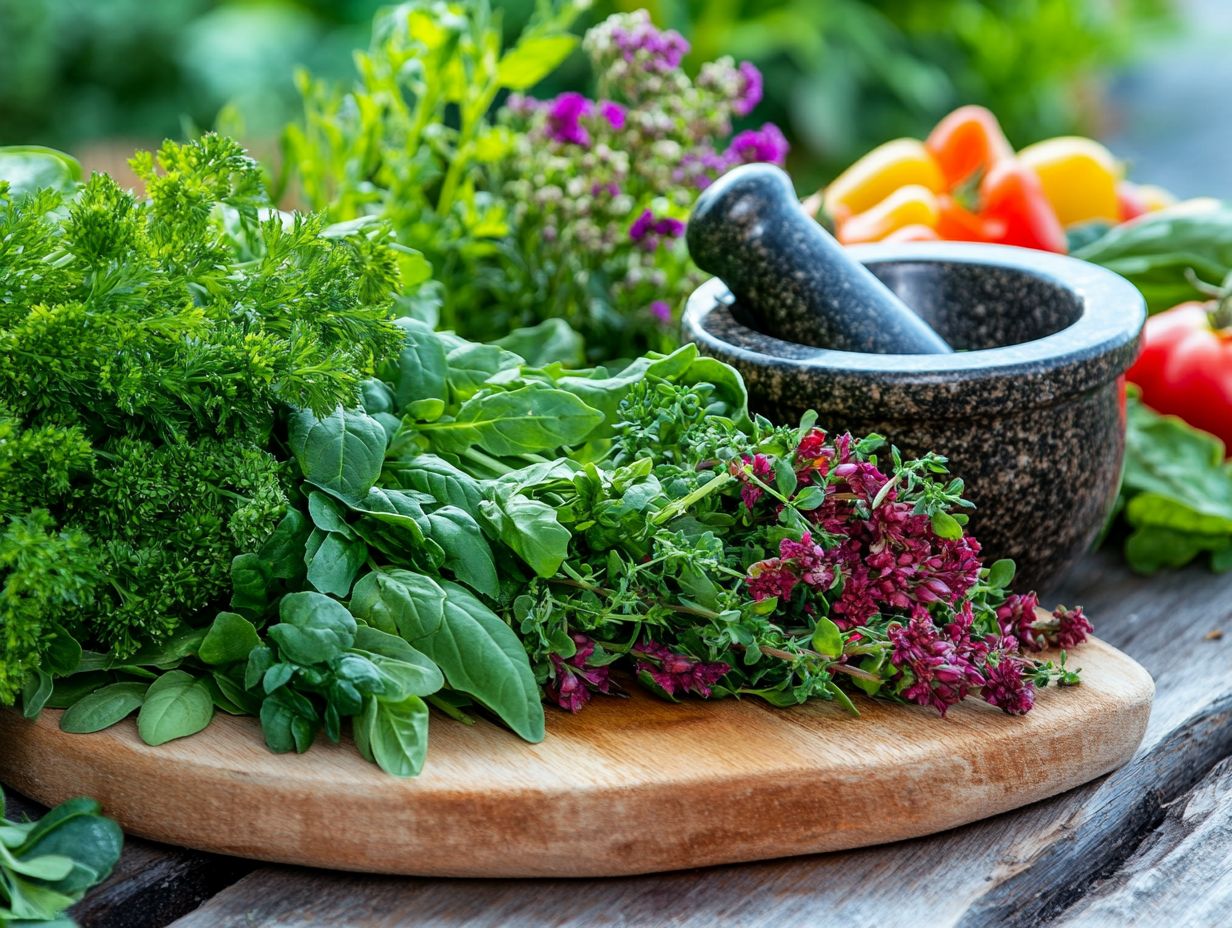
Herbs have the remarkable ability to elevate your gut health through a variety of mechanisms. Their anti-inflammatory properties work wonders, while they also play a vital role in supporting probiotics and digestive enzymes.
Embracing these natural powerhouses can lead to a more harmonious digestive experience.
Mechanisms of Action
The way herbs influence gut health is quite intricate, involving a host of mechanisms such as anti-inflammatory effects, boosting digestive enzymes, and promoting beneficial probiotics.
These mechanisms are essential for reducing digestive discomfort and streamlining the entire digestive process. For example, the anti-inflammatory properties found in herbs like turmeric and ginger can ease the symptoms of conditions such as irritable bowel syndrome (IBS) and inflammatory bowel disease (IBD) by reducing inflammation in the gut lining.
Certain herbs also boost the production of digestive enzymes, which are crucial for breaking down food into absorbable nutrients. This increase in enzymatic activity improves digestion and optimizes nutrient absorption, ensuring that vital vitamins and minerals enter your bloodstream efficiently.
Herbs like garlic and leeks promote the growth of helpful probiotics, which strengthen the community of good bacteria in your gut. A healthy microbiome plays a critical role in maintaining an effective barrier against harmful bacteria, supporting overall digestive health and enhancing the management of digestive diseases.
Incorporating Herbs into Your Diet
Get ready to boost your gut health! Incorporating herbs into your diet can significantly enhance your gut health and overall well-being, especially when you pair them with nutrient-rich foods and fermented options.
Embracing this flavorful approach not only elevates your meals but also nourishes your body in meaningful ways.
Recipes and Cooking Tips
Creating gut-friendly meals can be both simple and enjoyable, especially when you have the right recipes and cooking tips at your fingertips, showcasing a variety of herbs.
By integrating these beneficial herbs, you enhance your overall health and enjoy a delicious experience with every bite. The right combination of herbs can support digestion, boost immunity, and provide essential nutrients.
For instance, when you add basil and oregano to your dishes, you’re not just adding flavor; you’re also introducing powerful antioxidants. Dill, on the other hand, is celebrated for its digestive properties.
Experimenting with fresh versus dried herbs can unlock layers of flavor that transform an ordinary meal into a culinary delight. With straightforward instructions and tips, you can effortlessly infuse these herbs into your everyday cooking while reaping the health benefits.
Potential Risks and Side Effects
While herbs can offer a wealth of benefits for gut health, it’s crucial to remain mindful of the potential risks and side effects that may accompany their use. Act now to protect your health!
Precautions to Take When Using Herbs for Gut Health
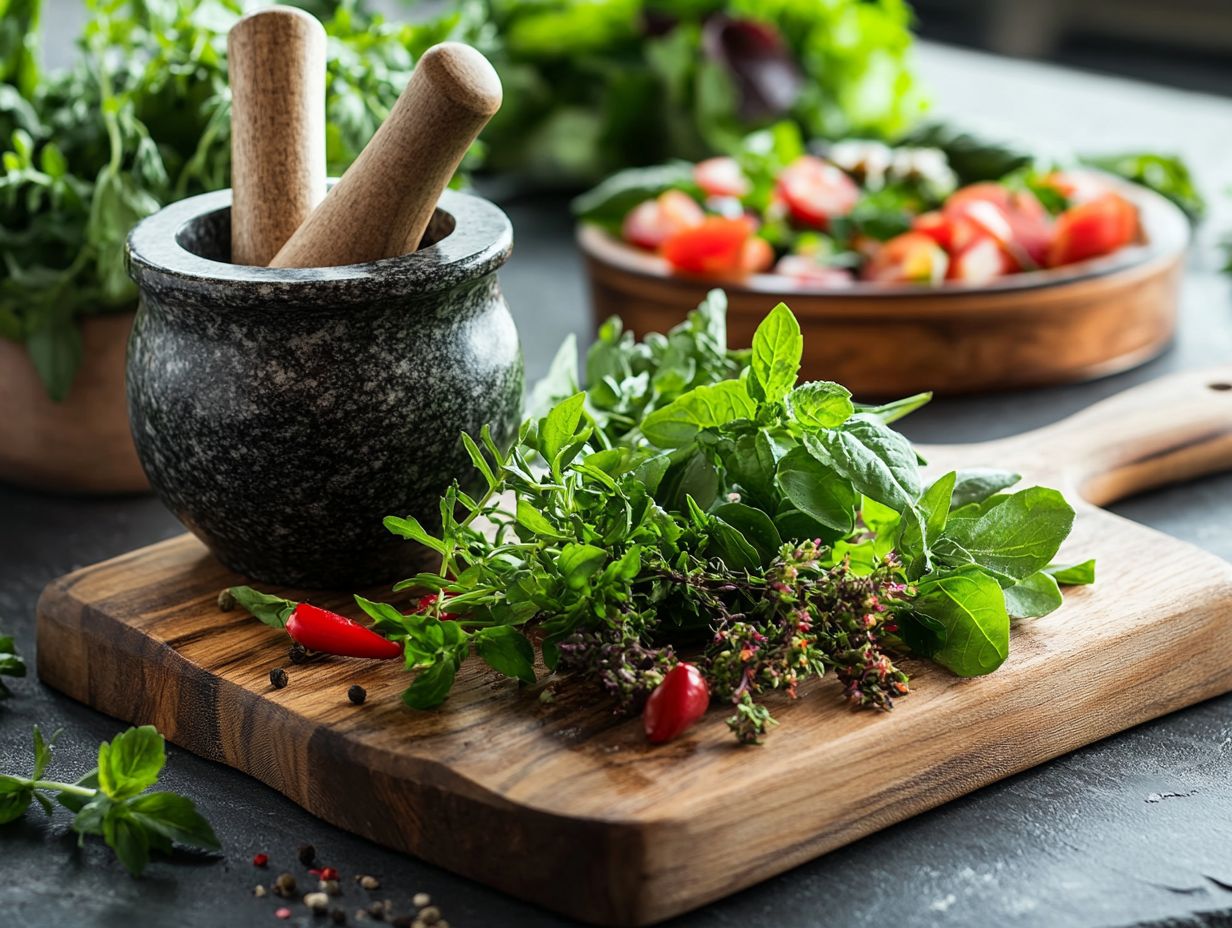
Taking precautions when using herbs for gut health is essential to ensure you reap safe and effective benefits without facing any adverse side effects. While herbal remedies offer numerous advantages, it’s vital to remain aware of potential interactions with conventional medications and the risks associated with antibiotic resistance.
Using herbs judiciously means understanding their properties and how they may impact your overall health. Some herbs could either enhance or diminish the effectiveness of prescribed medications, leading to unintended complications.
Misusing herbal products can contribute to the growing concern surrounding antibiotic resistance, as certain herbs may contain compounds that mimic the action of antibiotics. By consulting with healthcare professionals and discussing any existing treatments or conditions, you can navigate the complexities of herbal use more safely, ensuring that your choices support your overall well-being without jeopardizing your health.
Alternative Approaches to Gut Health
Exploring alternative approaches to gut health unveils a world of natural remedies and lifestyle changes that can greatly enhance your microbiome balance. By embracing these options, you can foster a healthier, more harmonious digestive system.
Start adding these flavorsome herbs to your meals today and feel the difference in your gut health!
Other Natural Remedies and Lifestyle Changes
Want to boost your gut health? Making natural remedies and thoughtful lifestyle changes can make a big difference. This approach helps prevent chronic diseases and can be fulfilling.
Start by adding fermented foods like yogurt and kimchi to your meals. They introduce good bacteria, known as probiotics, that help balance your gut.
Eating a variety of fiber-rich foods think fruits, vegetables, and whole grains supports healthy gut bacteria. Drinking enough water throughout the day aids digestion and helps absorb nutrients.
Regular exercise is also crucial for gut health. It improves digestion and reduces stress, making you feel better overall.
Frequently Asked Questions
What is the connection between herbs and gut health?
Herbs have been used for centuries for overall well-being. They can also help maintain a healthy gut by balancing good bacteria and reducing inflammation.
Which herbs are known to improve gut health?
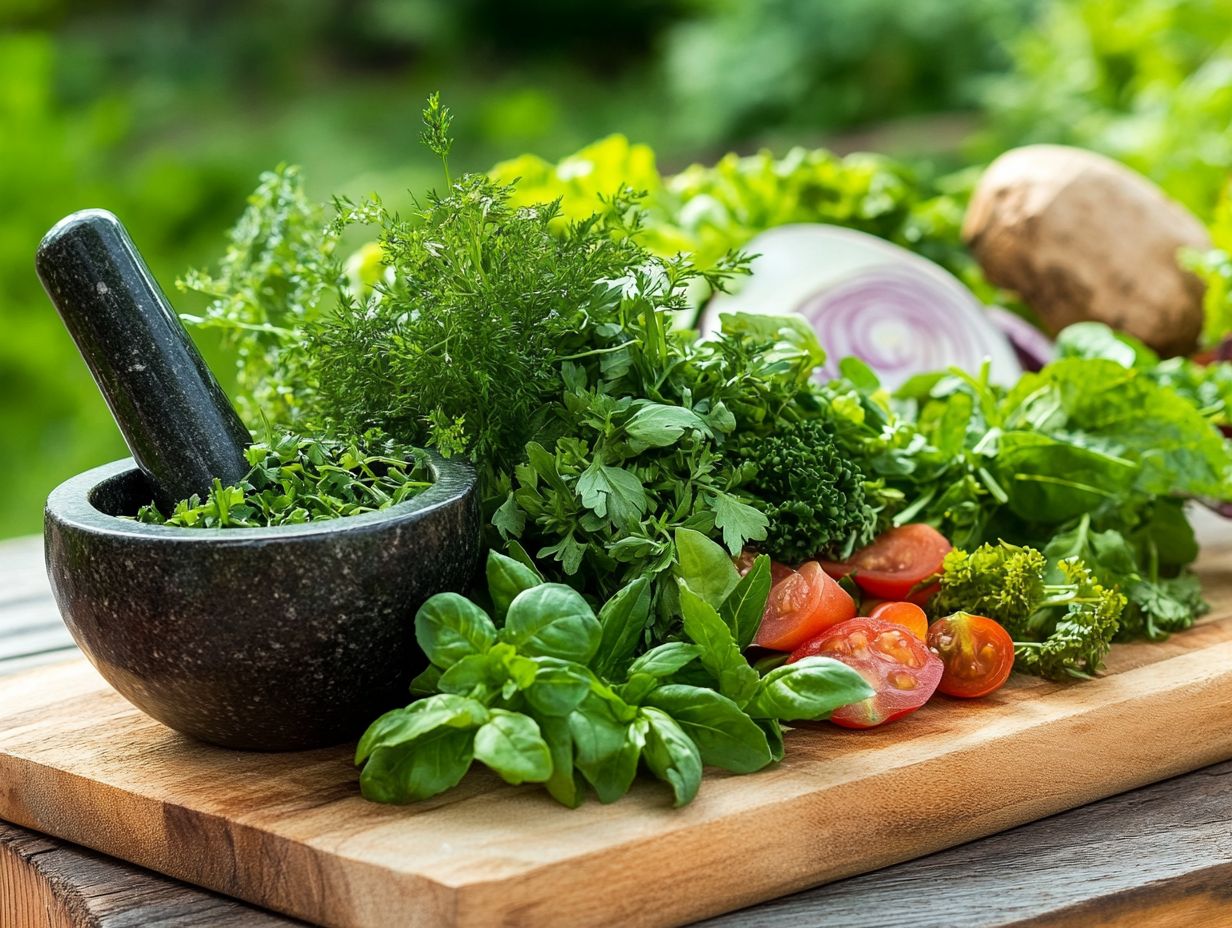
Popular herbs for gut health include ginger, peppermint, turmeric, and chamomile. They can reduce inflammation and promote beneficial bacteria.
How do herbs promote a healthy gut?
Herbs contain compounds that improve gut health. For example, ginger and peppermint can reduce inflammation, while chamomile and fennel soothe the digestive system.
Can herbs help with specific gut issues?
Yes! Ginger can relieve nausea and bloating. Peppermint helps with irritable bowel syndrome (IBS), while turmeric can ease inflammatory bowel disease (IBD).
How should I consume herbs for gut health?
You can use herbs fresh, dried, in teas, or as supplements. Always consult a healthcare practitioner before taking herbal supplements.
Are there any potential side effects of using herbs for gut health?
While herbs are usually safe, be aware of possible side effects. Some may interact with medications or cause digestive upset if over-consumed. Talk to a healthcare practitioner before using herbs, especially if pregnant or have health concerns.

